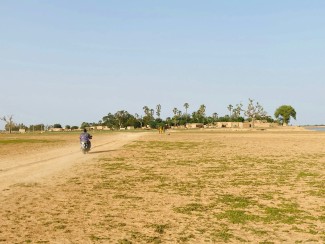Potatoes are one of Bhutan’s main exports, with the tiny landlocked country sending out 24,970 MT of potatoes in 2018, mostly to India.
The country has a conventional auction system for its produce in border towns with India, with potatoes by far the main commodity at the auction block. Potatoes, carrots, cauliflower and peppers in bulk line the floors at these sites, waiting for traders and the auctioneer to arrive. Just like you might expect, the auctioneer announces the initial price and counts to three for other offers until a deal is made.
The morning goes by with the auction moving from one commodity to another, farmers waiting with full trucks outside.
The next morning, the farmers who sold goods get their checks from the auction company, and then usually go straight to the bank to cash them. If farmers don’t sell all their goods that day, they will spend additional nights in town until they’ve sold everything. For traders, seeing the number of trucks around lets them know what price they should offer.
There was space to enhance this system – by improving the quality and packaging of the potatoes Bhutan puts up for sale, making prices more competitive and shortening the transaction times for farmers.
These changes have the same goal, getting farmers the most for their potato harvests.
With the enhancement in mind, the country tackled these improvements in partnership with the Enhanced Integrated Framework, adding machines to grade potatoes that are then packed in designed bags that go up for sale at online auctions.
Two potato grading machines were procured, each with a capacity of 20 MT per hour per machine. These machines, which aid with the sorting of harvests, are now at Food Corporation of Bhutan Ltd.’s auction yard in Phuntsholing, just at the Indian border. The machines have reduced potato processing times from four days to four hours.
Now, farmers can come in the morning with their truckloads of goods and have their potatoes graded and weighed. They can then go home. Once graded and packed, their potatoes are put to (online) auction. Prices are matched and deals are closed by the afternoon. Farmers receive their proceeds via their phones, and can cash out at the bank. And, no extra nights spent in Phuntsholing.
In 2016, approximately 316 MT of potatoes were auctioned. This number has now almost tripled, to 1,147 MT in 2017 and 1,441 MT in 2018. So far, more than 1,600 Bhutanese farmers have been shown how to work with the online auction system and have accessed the grading machines, 61% of whom are women. With the move to online sales, the country is also seeing even more women getting involved.
“Women play an important role in the agriculture sector in Bhutan, starting from cultivation to harvesting. The increased participation of women in the online auction shows that women are essential decision makers in the selling of their products at the market,” said Sangay Dorji, EIF Bhutan’s Monitoring and Evaluation Officer.
Another effect is the financing now available to facilitate transactions.
In Phuntsholing, Food Corporation of Bhutan Ltd. is providing small pre-finance loans of up to 75% of a transaction’s total to local and Indian buyers, with sums recovered once sales are complete.
“Unlike conventional auctioning, now farmers can get payment within a day of auctioning. This used to take two to three working days,” said Dorji.
EIF’s Hang Tran said, “When I visited the Phuntsholing auction yards for the first time in October 2019, I spent almost the whole day there seeing the traditional auction in one yard, the potato grading machine in another space and the online auction in the other yard. It was fulfilling to see how this small contribution from EIF could change the lives of thousands of farmers. When Bhutan Food told me that it was purchasing a third potato grading machine with its own budget – in response to the demand from farmers – I knew this partnership had born fruit.”
Ultimately, the main result has been more cash in the hands of Bhutan’s farmers.
“Farmers can be earning up to 30,000 Bhutan Ngultrums (US$420) more per truckload using the online platform than in the conventional method of auctioning,” said Dorji.
If you would like to reuse any material published here, please let us know by sending an email to EIF Communications: eifcommunications@wto.org.



